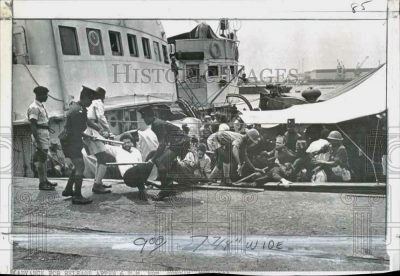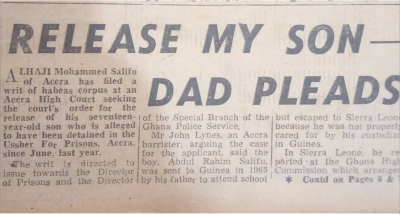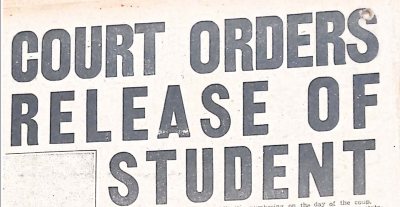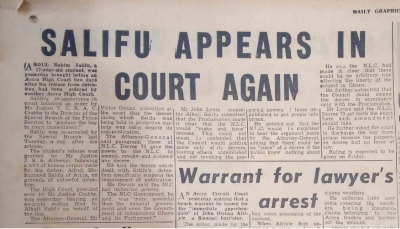Rahim Baba Salifa: The Boy Caught Between Ghana-Guinea Tensions
[Dedication: This piece is dedicated to a dear friend and law school mate, Richard Badombie Esq whose tragic passing at the hands of some armed persons has left us in shock. He would be sorely missed for his public spiritedness and warm personality]
The early times of legislation college was tricky. It necessary obtaining employed to the scenario legislation technique of teaching and understanding. And adapting to the workload. There have been way too numerous scenarios to cram and little time to mirror.
As speedily as circumstances had been read through, they were being forgotten. But irrespective of all this, a couple of situations make an impression on you. And this stays with you for a long time. The Republic v Director of Prisons, Ex parte Salifa[1] was 1 of all those conditions for me.
Place the authorized complexities, and jargons absent and this case is simply just about a child in the grip of the Condition and a father yelling and undertaking all he could to have his son back. Nothing at all is mentioned of what the kid is suspected of. But it was broadly believed the boy was being held on the cost of subversion.
To improved respect this story, let’s start off with the overthrow of Ghana’s initial President, Osagyefo Dr. Kwame Nkrumah. This was in 1966. A group of senior army and law enforcement officers led by Lieutenant General (retired) J.A. Ankrah led a coup to overthrow Ghana’s initial president. Kwame Nkrumah, by then had left Ghana and was on his way to Hanoi, at the invitation of the Vietnamese Chief, Ho Chi Minh. Soon after a amount of end overs, Nkrumah lastly settled in Hanoi. It would not get long for information of his overthrow to get to him on 24 February 1966. It was not a little something Nkrumah noticed coming. On 25 February 1966, Nkrumah by way of his Foreign Minister, Mr Alex Quaison Sackey, declared that he was still the Head of Point out of Ghana and that he would return soon.
Nkrumah need to have acknowledged that returning to Ghana was not an possibility. He flew to Moscow and then from Moscow to Conakry, Guinea. This was on 2nd March 1966. There, he was designed a co-President. The choice of Guinea was not odd. Nkrumah had been generous to Guinea. In 1958, Nkrumah lent 5,000,000 lbs to Guinea, and Guinea’s reciprocity was understandably organic.
And it was on this working day, 2nd March 1966, that Nkrumah would make a speech that would not only put a pressure on the diplomatic marriage among Ghana and Guinea. It would, in all probability, change the daily life of a boy – for good.
When Nkrumah arrived in Guinea, he declared:
“I have arrive right here purposely to use Guinea as a system to convey to the planet that incredibly shortly I shall be in Accra, in Ghana. I am not likely to say just about anything from anyone, simply because I realize perfectly the things at perform in the entire world today… All we have to do is to stand business and see how we can counteract these aspects.[2]”
Nkrumah’s presence in Guinea and the support he drew from the Guinean Condition came at a charge. The governing administration of the Countrywide Liberation Council closed the Ghanaian embassy in Conakry. Ghana’s diplomatic mission was recalled.
But none of these moves seemed to have bothered either Nkrumah or Sekou Touré. Whiles in Guinea, Nkrumah continued to reach out to Ghanaians as a result of radio broadcast. He would speak about returning before long to Ghana and putting to dying all military services leaders. “I know that when the time arrives, you will crush the new regime. I know the Ghanaian folks will continue being trustworthy to me as effectively as to my celebration and my governing administration.[3]”
Sekou Toure piled up the strain. “20,000 Guinean ex-servicemen who experienced been in the French Army, as nicely as 50,000 soldiers recruited from females users and youths of the Guinean Democratic Bash” would be likely to Ghana “in armed service convoys to assist the Ghanaian men and women free of charge itself from the dictatorship of the armed service traitors[4]”, he declared.
The NLC was on the edge. It did not just take Nkrumah’s terms evenly and thought in the possibility of a countercoup d’état. For instance, a soviet trawler was arrested off the Takoradi harbour as there ended up fears that the Soviet Union/Russians were being operating towards the removing of the NLC.

The higher than history paints a fair picture of the condition of relations among Ghana and Guinea, and the political local climate in Ghana. It is, hence, not difficult to see how anyone from Guinea may well end up remaining viewed with suspicion.
The protagonist in this story was a young guy by the title of Salifa or Salifu. The regulation reports named him as Mohammed Abdul Rahim Baba Salifa. The newspapers of the working day named him as Abdul Rahim Baba Salifu. For this piece, let’s phone him Salifa.
Salifa was a fifteen-calendar year-old schoolboy despatched to Guinea by his father in 1965 to review. Two several years later, he ran away from his guardian. He operate away for the reason that he was remaining maltreated by his guardian. This was not out of the blue. He experienced formerly complained and written about the maltreatment he experienced at the hands of his Guinean guardian – Dr Oury. His father had letters to show. There was, thus, an founded pattern of abuse and mistreatment. So, he selected to flee.
He did not come to Ghana immediately. His initial quit was Sierra Leone exactly where he asked the Ghanaian Higher Commissioner to enable him return to his parents in Ghana. He got the enable he asked for. But not in the way he anticipated. He arrived in Ghana in June 1967. But after he touched down, he was arrested by the law enforcement and detained at the Ussher Fort Prison. He was not billed with any prison offence. He was just imprisoned. He was dwelling but could not get household. The legislation report did not give any reason for his arrest. Neither did the newspapers. It was extensively rumoured and believed that he was getting held simply just because he experienced arrived from Guinea. Many others rumoured that he might have been an agent of the Nkrumah despatched to produce some messages to Nkrumah loyalists in Ghana.
 With his son at the Ussher Fort prison, his father attempted to do the quite normal detail: get his son out of jail. A 12 months soon after Salifa’s detention (i.e., in June 1968), his father engaged a law firm to compel the prison authorities to make his son. A date was scheduled for the listening to. The Director of Prisons confirmed up. He experienced a decree signed by the Chairman of the Countrywide Liberation Council supposedly authorizing the arrest and detention of Salifa.
With his son at the Ussher Fort prison, his father attempted to do the quite normal detail: get his son out of jail. A 12 months soon after Salifa’s detention (i.e., in June 1968), his father engaged a law firm to compel the prison authorities to make his son. A date was scheduled for the listening to. The Director of Prisons confirmed up. He experienced a decree signed by the Chairman of the Countrywide Liberation Council supposedly authorizing the arrest and detention of Salifa.
 Salifa’s lawyer challenged the validity of the decree issued by Normal Ankrah on the grounds that the decree was undated and not gazetted. Salifa’s law firm, John Lynes an Australian who had appear to settle in Ghana and would inevitably be deported, argued that the decree did not mention Salifa’s identify and therefore it could not have applied to him. The acquired Significant Court decide, Anterkyi J agreed with Salifa’s law firm and concluded that the decree authorizing the arrest and detention of Salifa was defective and not compliant with the Countrywide Liberation Council’s individual proclamation. On that foundation, Salifa was introduced.
Salifa’s lawyer challenged the validity of the decree issued by Normal Ankrah on the grounds that the decree was undated and not gazetted. Salifa’s law firm, John Lynes an Australian who had appear to settle in Ghana and would inevitably be deported, argued that the decree did not mention Salifa’s identify and therefore it could not have applied to him. The acquired Significant Court decide, Anterkyi J agreed with Salifa’s law firm and concluded that the decree authorizing the arrest and detention of Salifa was defective and not compliant with the Countrywide Liberation Council’s individual proclamation. On that foundation, Salifa was introduced.
But not for extended.
He was instantly re-arrested and brought prior to a distinct court. The initial circumstance was taken care of by Mr. K. Gyeke-Darko, a Principal Point out Attorney, who was famed for prosecuting many coup plot trials. In the re-arrest proceedings, the Attorney-Normal, Victor Owusu, and the Director for Public Prosecutions ended up in court docket. The presence of the Legal professional-Standard and the Director for Public Prosecutions sums up the importance the NLC positioned on this scenario.
Mr. Victor Owusu, as quoted in the 11th July 1968 Everyday Graphic, argued that the NLC governing administration experienced unrestricted powers and  was “more potent than the colonial government and even the Authorities of independent Ghana and its Parliament”. Extensive story small, the NLC could not whatever it needed to do, which includes arresting a seventeen-yr-aged boy without the need of cost and lawful foundation. The second court docket, presided above by Justice V.C.R.A.C Crabbe upheld the validity of the exact same detention get, and Salifa was guiding bars once again. And this is where by the story ends.
was “more potent than the colonial government and even the Authorities of independent Ghana and its Parliament”. Extensive story small, the NLC could not whatever it needed to do, which includes arresting a seventeen-yr-aged boy without the need of cost and lawful foundation. The second court docket, presided above by Justice V.C.R.A.C Crabbe upheld the validity of the exact same detention get, and Salifa was guiding bars once again. And this is where by the story ends.
We only get an perception into Salifa’s imagining in a letter he wrote to his father. In his personal text he writes:
“Please, father, I will like you to know that when I was coming I documented myself to the Ghana Significant Commissioner in Sierra Leone that I am a seventeen-year previous scholar who has been to Guinea in 1965 Oct (i.e. during the outdated federal government) and desired to appear back again to Ghana and continue to be with my dad and mom, the place I will be equipped to proceed my studies. Nicely, this male (the Large Commissioner) gave me a ticket, ready my travelling certificate and assisted me to embark into the airplane for Ghana – with all my loyalty I am arrested.
Every little thing is apparent, I think, that if I have been coming to do one thing in opposition to the governing administration I would not have passed through the Ghana High Commissioner in Sierra Leone, but, as I explained, I am destined to be arrested. So, go away every little thing to God, father.
Be sure to, each time you receive a letter from Oury declaring that I have operate absent, consider that letter to the Unique Branch (C.I.D.) with my letters which convey to you that I am in prison in Ghana, so you have occur to beg them torelease me mainly because I am innocent and I am a university student, I am not interested in politics.”
Captured in the above letter is a complicated and conflicting established of feelings. Salifa asserts his innocence, arrives to terms with his conditions, attempts to console the father, and someplace in there wishes that his guardian in Guinea Dr. Oury will publish to the Ghanaian authorities to corroborate his story and ideally get him released.
Not considerably is regarded of the fate of Salifa. Did he die? Did he survive the turbulent intervals in incarceration? How very long was he there? Was he ultimately released? Did he eventually get to know the rates levelled versus him? What sort of everyday living did he are living later on? It is hard to tell. It has been previous 50 percent of a century because the activities described in this piece took area. And regrettably, Salifa’s tale is continue to waiting to be explained to – in total.
***: I would like to thank Mr. Fui Tsikata of Reindorf Chambers for his thoughts and perception on the subject matter. Also, my gratitude goes to Oliver Barker Vormawor and Ama Asare Korang for reviewing previously drafts of this piece.
[1] [1968] GLR 630
[2]Keesing’s present-day archives, March 12-19, pg. (21275) http://world-wide-web.stanford.edu/group/tomzgroup/pmwiki/uploads/1408-1966-Keesings-a-EYJ.pdf
[3] Ibid
[4] Ibid








